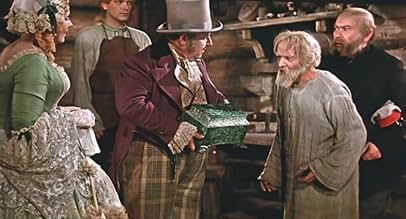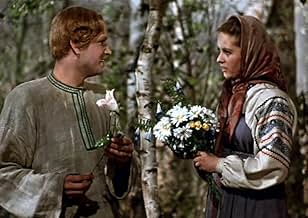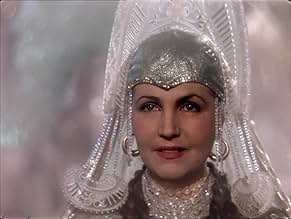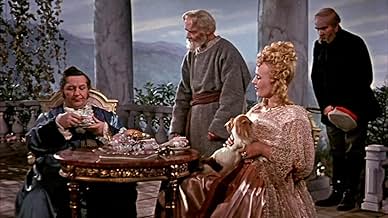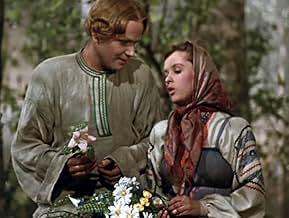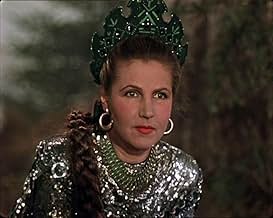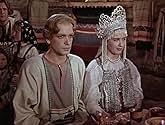NOTE IMDb
7,1/10
559
MA NOTE
Ajouter une intrigue dans votre langueObsessed with perfecting his craft, young gemcutter Danilo visits the mystical Copper Mountain to uncover the secret behind its infamous attraction - the Stone Flower, a stone carving so cap... Tout lireObsessed with perfecting his craft, young gemcutter Danilo visits the mystical Copper Mountain to uncover the secret behind its infamous attraction - the Stone Flower, a stone carving so captivating that no one can leave after seeing it.Obsessed with perfecting his craft, young gemcutter Danilo visits the mystical Copper Mountain to uncover the secret behind its infamous attraction - the Stone Flower, a stone carving so captivating that no one can leave after seeing it.
- Réalisation
- Scénario
- Casting principal
- Récompenses
- 2 victoires et 2 nominations au total
Vladimir Druzhnikov
- Danilo - master
- (as V. Druzhnikov)
Yekaterina Derevshchikova
- Katya
- (as Y. Derevshchikova)
Mikhail Troyanovskiy
- Prokopych
- (as M. Troyanovsky)
Mikhail Yanshin
- Severyan
- (as M. Yanshin)
Nikolay Temyakov
- Barin
- (as N. Temyakov)
Anna Petukhova
- Barina
- (as A. Petukhova)
Nikolai Orlov
- Stary master
- (as N. Orlov)
Lidiya Deikun
- Vikhorika
- (as L. Deikun)
Serafim Zaytsev
- Yefimka
- (as S. Zaytsev)
Vitaliy Kravchenko
- Danilo - malchyk
- (as V. Kravchenko)
Avis à la une
Seen shortly after it was released. A beautiful, and apparently rare film, since I have never seen a video of it available. Easily equal to the work of Serge Eisenstein, produced during the Stalinist days of the USSR, but is a telling of a famous Russian fable. An excellent film, which should be on video.
The art direction and production design in the movie is really quite fetching. The physical film that was accordingly used to shoot 'The stone flower' resulted in rich, vibrant colors that allow every little trait to pop out brilliantly. Wonderful attention to hair, makeup, costume design, and set design and decoration, and every nuance of the cast's performances, is realized with inspiring vividness. Moreover, director Aleksandr Ptushko demonstrates a keen eye for arranging some fine shots, solid camerawork, and good care for lighting. And these are only just the visual aspects of what is an engaging, charming interpretation of a folk tale.
All the assembled actors put on fine displays of their skills to bring the picture to life, with Vladimir Druzhnikov especially notable as protagonist Danilo - believably portraying the young man's resolve, and obsession. Yet to discuss such facets at greater length seems unimportant when above all they serve simply as a component of the whole. It's the writing and direction that makes 'The stone flower' the entertaining classic that it is. Characters generally aren't written with especial depth, but like the acting, they work to complete the tableau. So it is too with the dialogue, very much feeling like the living communication of the sort of story that would be passed down over years - in no few ways a fable about the folly of pride, and ambition. And with that said, the fantastical scene writing and overall narrative are the greatest treasures here: terrifically entrancing, flush with detail and careful consideration, and enriching the entirety of the feature in their excellence. Druzhnikov matches the grand screenplay with adept focus and dexterity, tying the picture together with marvelous, expert finesse.
Factor in winsome set pieces, modest but suitable special effects - on par with any of the era - and gratifying instances of deftly arranged song and dance, and 'The stone flower' quite feels like it could be an early live-action production of Walt Disney's imagination. It's superb in its craft, and pleasantly endearing - really just an all-around lovely slice of cinema. If I have any specific criticism to make, it may perhaps be that the pacing struggles early on to find its footing. Yet for as splendidly well as the film is made, what slight deficiencies do crop up are negligible, and not truly significant. This is a magically, quietly engrossing movie, appropriate for all ages, that I think is surely very enjoyable for any viewer receptive to the type of story that it relates. I'd have no qualms recommending this to just about anyone - 'The stone flower' is a lot more fun, satisfying, and even rewarding than I thought it was going to be, and this is well worth checking out if you have the opportunity!
All the assembled actors put on fine displays of their skills to bring the picture to life, with Vladimir Druzhnikov especially notable as protagonist Danilo - believably portraying the young man's resolve, and obsession. Yet to discuss such facets at greater length seems unimportant when above all they serve simply as a component of the whole. It's the writing and direction that makes 'The stone flower' the entertaining classic that it is. Characters generally aren't written with especial depth, but like the acting, they work to complete the tableau. So it is too with the dialogue, very much feeling like the living communication of the sort of story that would be passed down over years - in no few ways a fable about the folly of pride, and ambition. And with that said, the fantastical scene writing and overall narrative are the greatest treasures here: terrifically entrancing, flush with detail and careful consideration, and enriching the entirety of the feature in their excellence. Druzhnikov matches the grand screenplay with adept focus and dexterity, tying the picture together with marvelous, expert finesse.
Factor in winsome set pieces, modest but suitable special effects - on par with any of the era - and gratifying instances of deftly arranged song and dance, and 'The stone flower' quite feels like it could be an early live-action production of Walt Disney's imagination. It's superb in its craft, and pleasantly endearing - really just an all-around lovely slice of cinema. If I have any specific criticism to make, it may perhaps be that the pacing struggles early on to find its footing. Yet for as splendidly well as the film is made, what slight deficiencies do crop up are negligible, and not truly significant. This is a magically, quietly engrossing movie, appropriate for all ages, that I think is surely very enjoyable for any viewer receptive to the type of story that it relates. I'd have no qualms recommending this to just about anyone - 'The stone flower' is a lot more fun, satisfying, and even rewarding than I thought it was going to be, and this is well worth checking out if you have the opportunity!
This faux (?) folktale, probably the best known film of Soviet fabulist Aleksandr Ptushko, is a paean to artistic individuality: a daydreaming youth becomes protégé to an old stone carver; visits the secret cave of a mountain witch to delve into his art; and then, with the unwavering trust of his deserted bride, finds his way back into the world as absolute master of his craft. A rather non-collective idea to find in the Stalinist film world of the time. Ptushko's style often looks like some over-decorated/Russian-themed Christmas window, but it certainly fits his subject. The crudity in the technique comes off as sincerity and the USSR color processing of the era is often quite lovely if you boost the brightness level on your equipment. Aimed at kids, but probably best for grown up cultural Sovietologists.
NOTE: Check out the DVD extras for an amazing stop-motion animation clip from Ptsuhko's 1936 pic THE NEW GULLIVER.
NOTE: Check out the DVD extras for an amazing stop-motion animation clip from Ptsuhko's 1936 pic THE NEW GULLIVER.
So says the grizzled old factory watchman at the conclusion of the folk tale he's been telling the children huddled around his fire through the Russian night. One of the young boys comes quietly up to him as the others leave, and tells him that he too wants to be a master-stoneworker, like the hero of the story: "ah!", says the watchman, "you got the point!" And the point's not just for children, either.
Ptushko's memorably beautiful film makes for a gripping parable about the conflict between the inner and outer life of the born artist, willing to risk sacrificing everything - even the woman he loves - in pursuit of artistic and technical perfection. At the secret heart of the Copper Witch's caverns, the Stone Flower itself represents that unattainable ideal of beauty, natural material fashioned so cunningly that it seems more real than reality itself. Danila, deeply unsatisfied with his work admired though it is by so many, has to study its form at any price, leaving his betrothal feast to pursue his ideal and hone his technique.
Will Danila break free of the Copper Witch's charms, and return to the "real world"? You'll have to watch the film to find out...
With only four significant characters - the young genius, the ageing and ailing master-craftsman who teaches (or is taught by) him, his faithful betrothed Katinka, and of course the Copper Witch herself - "Kamennyy tsvetok" is much more tightly structured and less riotously inventive than some of the other Ptuchko films I've been privileged to see, and the tension never flags.
Political content, too, is restrained - surprisingly so, given the film's date and the fact that it was (as other commentators have pointed out) the first major Russian film to be made in colour. The peasants are duly repressed by the fat and frivolous landowners and their brutal class-traitor henchmen, but (assuming that *my* brain has figured it out correctly!) the clear message is that whatever its conflicts with everyday life and relationships, art certainly transcends politics and class. Surprising indeed. There's even a moment in the beautifully depicted and choreographed folk betrothal where religious icons are bowed to with grace and reverence. It is amazing that Ptushko was daring enough to try to get that one past the censors, let alone manage to succeed!
The commentator who compared the visual feast on offer with Powell and Pressburger's roughly contemporary "The Red Shoes" was spot on: their "Tales of Hoffmann" is even closer in spirit. Ptushko's visual imagination and daring are in that league, and his colour process produced really breathtaking pictures. If his images here seem more illustrative and pictorial, less intrinsically filmic than the art of those English masters, they are none the less memorable. The magic scenes in the woods, and in the gem-sparkling caverns, are of a loveliness seldom matched in film of any era, and never surpassed.
The currently available RUSCICO DVD version is quite beautifully restored visually, and the sound is very acceptable too. With good extras, including a half-hour feature about Ptushko's life and work showcasing extracts from many of his other films, why not treat yourself and your family, if you have one, to this rich folk-tale? If you respond to it as I did, you may even manage - for one brief, shining moment - to feel that you are nine years old once again!
Ptushko's memorably beautiful film makes for a gripping parable about the conflict between the inner and outer life of the born artist, willing to risk sacrificing everything - even the woman he loves - in pursuit of artistic and technical perfection. At the secret heart of the Copper Witch's caverns, the Stone Flower itself represents that unattainable ideal of beauty, natural material fashioned so cunningly that it seems more real than reality itself. Danila, deeply unsatisfied with his work admired though it is by so many, has to study its form at any price, leaving his betrothal feast to pursue his ideal and hone his technique.
Will Danila break free of the Copper Witch's charms, and return to the "real world"? You'll have to watch the film to find out...
With only four significant characters - the young genius, the ageing and ailing master-craftsman who teaches (or is taught by) him, his faithful betrothed Katinka, and of course the Copper Witch herself - "Kamennyy tsvetok" is much more tightly structured and less riotously inventive than some of the other Ptuchko films I've been privileged to see, and the tension never flags.
Political content, too, is restrained - surprisingly so, given the film's date and the fact that it was (as other commentators have pointed out) the first major Russian film to be made in colour. The peasants are duly repressed by the fat and frivolous landowners and their brutal class-traitor henchmen, but (assuming that *my* brain has figured it out correctly!) the clear message is that whatever its conflicts with everyday life and relationships, art certainly transcends politics and class. Surprising indeed. There's even a moment in the beautifully depicted and choreographed folk betrothal where religious icons are bowed to with grace and reverence. It is amazing that Ptushko was daring enough to try to get that one past the censors, let alone manage to succeed!
The commentator who compared the visual feast on offer with Powell and Pressburger's roughly contemporary "The Red Shoes" was spot on: their "Tales of Hoffmann" is even closer in spirit. Ptushko's visual imagination and daring are in that league, and his colour process produced really breathtaking pictures. If his images here seem more illustrative and pictorial, less intrinsically filmic than the art of those English masters, they are none the less memorable. The magic scenes in the woods, and in the gem-sparkling caverns, are of a loveliness seldom matched in film of any era, and never surpassed.
The currently available RUSCICO DVD version is quite beautifully restored visually, and the sound is very acceptable too. With good extras, including a half-hour feature about Ptushko's life and work showcasing extracts from many of his other films, why not treat yourself and your family, if you have one, to this rich folk-tale? If you respond to it as I did, you may even manage - for one brief, shining moment - to feel that you are nine years old once again!
I saw The Stone Flower back in the forties shortly after it was released. I have never forgotten it. The color was so amazing that some of the images have remained permanently imprinted in my brain! I am disappointed that it is unavailable on video nor have I ever seen t revived anywhere where I have been. I am glad there are at least a few others who remember it.
Le saviez-vous
- ConnexionsFeatured in Adieu l'URSS! (2021)
Meilleurs choix
Connectez-vous pour évaluer et suivre la liste de favoris afin de recevoir des recommandations personnalisées
Détails
- Durée
- 1h 29min(89 min)
- Mixage
- Rapport de forme
- 1.37 : 1
Contribuer à cette page
Suggérer une modification ou ajouter du contenu manquant

